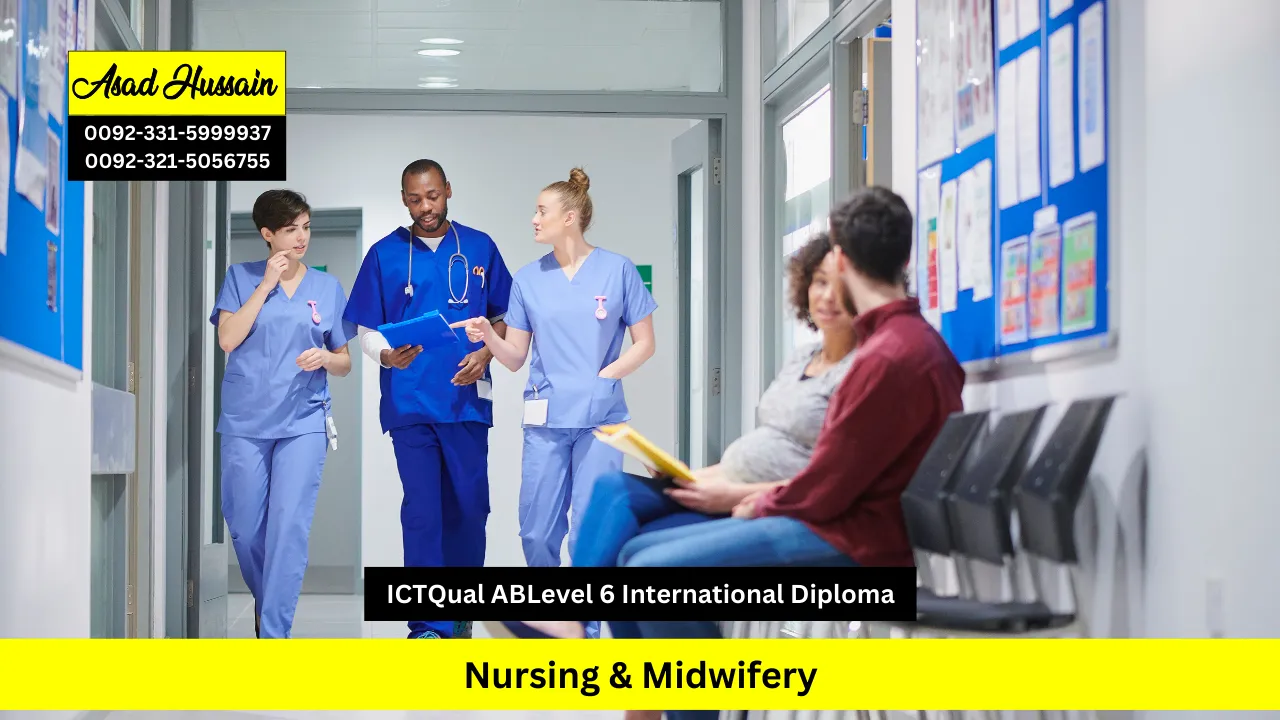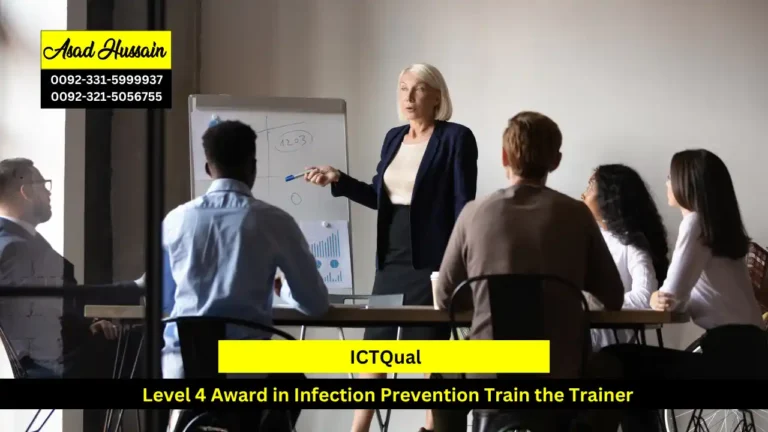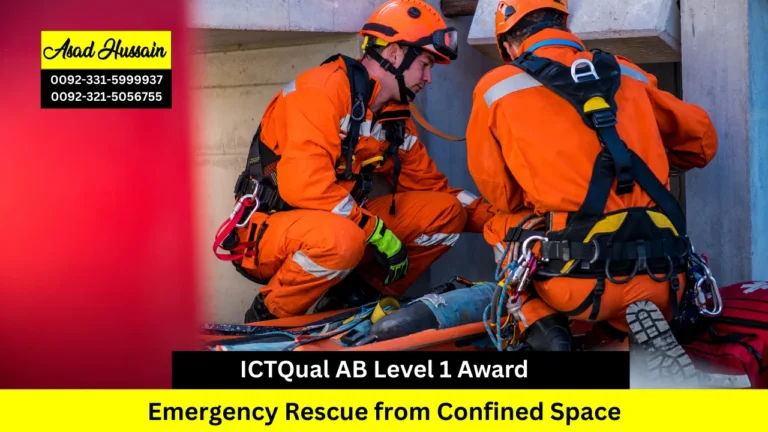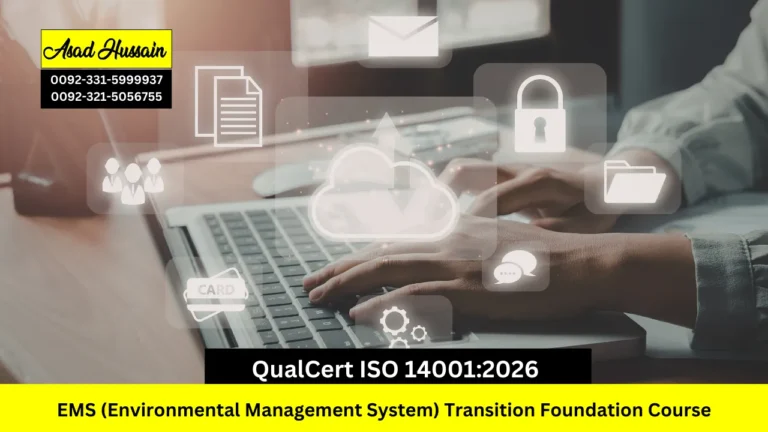The ICTQual AB Level 6 International Diploma in Nursing & Midwifery is designed to provide learners with advanced knowledge, clinical skills, and professional competencies to excel in diverse healthcare environments. ICTQual AB Level 6 International Diploma in Nursing & Midwifery bridges the gap between theoretical learning and practical application, ensuring graduates are well-prepared to meet global healthcare standards.
ICTQual AB Level 6 International Diploma in Nursing & Midwifery covers essential areas of nursing practice, midwifery care, patient management, healthcare ethics, and evidence-based decision-making. Learners will engage with both classroom-based instruction and practical training, gaining hands-on experience in areas such as maternal health, neonatal care, patient safety, and community healthcare. By blending academic depth with clinical expertise, the ICTQual AB Level 6 International Diploma in Nursing & Midwifery empowers learners to deliver compassionate, safe, and effective care across a range of healthcare settings.
Graduates of this program will not only develop the ability to support patients and families during critical health experiences but also strengthen their leadership and communication skills, enabling them to work effectively in multidisciplinary teams. With a focus on professional growth,ICTQual AB Level 6 International Diploma in Nursing & Midwifery opens pathways to rewarding careers in hospitals, maternity units, public health organizations, and global healthcare institutions.
Program Highlights
Study Units
Year 1: Foundational Knowledge
- Introduction to Nursing and Midwifery Practice
- Fundamentals of Human Anatomy and Physiology
- Principles of Microbiology and Infection Control
- Foundations of Pharmacology and Medication Safety
- Professional Ethics and Legal Frameworks in Healthcare
- Communication Skills for Healthcare Professionals
- Health Promotion and Public Health Basics
- Psychology and Sociology in Healthcare
- Nutrition, Dietetics, and Patient Wellbeing
- Basic Clinical Skills and Patient Care Techniques
- First Aid and Emergency Response in Healthcare
- Introduction to Research and Evidence-Based Practice
Year 2: Intermediate Proficiency
- Adult Nursing and Clinical Care
- Maternal Health and Midwifery Principles
- Child and Adolescent Health Nursing
- Mental Health Nursing and Psychiatric Care
- Community Health Nursing and Primary Care
- Pathophysiology and Clinical Diagnostics
- Advanced Pharmacology and Therapeutics
- Infection Prevention and Control in Healthcare Settings
- Health Assessment and Clinical Decision Making
- Nursing Informatics and Digital Healthcare Systems
- Leadership and Teamwork in Healthcare Practice
- Applied Research Methods in Nursing and Midwifery
Year 3: Advanced Specialization and Application
- Advanced Adult Nursing and Critical Care
- Midwifery Practice: Labour, Delivery, and Postnatal Care
- Paediatric and Neonatal Nursing
- Geriatric Nursing and Palliative Care
- Advanced Mental Health and Counselling in Nursing
- Global Health Issues and Healthcare Policy
- Advanced Clinical Skills and Patient Safety
- Healthcare Management and Leadership Strategies
- Quality Improvement and Risk Management in Healthcare
- Professional Development and Reflective Practice in Nursing
- Dissertation / Research Project in Nursing & Midwifery
- Clinical Placement / Practical Competency Assessment
To maintain academic quality and ensure learners are well-prepared, applicants must meet the following entry requirements:
Age Requirements
- Applicants must be at least 18 years of age at the time of enrollment.
- Mature learners above 21 with relevant healthcare experience may also apply.
Educational Requirements
- A Level 5 diploma or equivalent qualification in healthcare, nursing, or a related field is required.
- Applicants with strong secondary education and practical nursing experience may be considered.
Professional Experience
- Prior work or training in a healthcare, nursing, or caregiving environment is highly recommended.
- Experience in patient care, clinical assistance, or midwifery-related roles will strengthen the application.
English Language Proficiency
- Applicants should demonstrate proficiency in English, as the program involves medical terminology and academic writing.
- A recognized English qualification (such as IELTS or equivalent) or evidence of previous study in English is preferred.
By meeting these entry requirements, learners ensure they are equipped to fully engage with the academic and clinical components of the ICTQual AB Level 6 International Diploma in Nursing & Midwifery.
The ICTQual AB Level 6 International Diploma in Nursing & Midwifery is designed to equip learners with comprehensive knowledge, advanced clinical skills, and professional competence required for modern healthcare settings. Graduates will gain expertise to provide high-quality patient care, contribute to healthcare management, and implement evidence-based practices across diverse nursing and midwifery environments.
Year 1: Foundational Knowledge
Introduction to Nursing and Midwifery Practice
- Understand the roles and responsibilities of nurses and midwives in healthcare delivery.
- Apply foundational nursing principles to patient care scenarios.
- Demonstrate professional conduct and accountability in clinical settings.
Fundamentals of Human Anatomy and Physiology
- Describe the structure and function of human body systems relevant to nursing.
- Correlate physiological processes with patient health and disease.
- Apply anatomical knowledge to safe and effective care practices.
Principles of Microbiology and Infection Control
- Identify microbial pathogens and their modes of transmission.
- Implement infection prevention and control measures in healthcare settings.
- Monitor and evaluate hygiene practices for patient and staff safety.
Foundations of Pharmacology and Medication Safety
- Understand common medications and their mechanisms of action.
- Administer medications safely according to professional guidelines.
- Evaluate patient outcomes and monitor for adverse effects.
Professional Ethics and Legal Frameworks in Healthcare
- Apply ethical principles in nursing and midwifery practice.
- Demonstrate understanding of legal responsibilities and healthcare regulations.
- Evaluate decision-making in complex patient care scenarios.
Communication Skills for Healthcare Professionals
- Apply effective communication with patients, families, and multidisciplinary teams.
- Develop patient education strategies to enhance health literacy.
- Measure communication effectiveness using patient feedback and clinical outcomes.
Health Promotion and Public Health Basics
- Plan and implement basic health promotion initiatives.
- Apply public health principles in community and clinical settings.
- Evaluate program effectiveness using measurable health indicators.
Psychology and Sociology in Healthcare
- Understand psychological and social factors affecting patient health.
- Apply behavioural science principles in patient care.
- Assess patient needs holistically, considering mental and social wellbeing.
Nutrition, Dietetics, and Patient Wellbeing
- Assess nutritional status and develop appropriate care plans.
- Implement dietary interventions to support patient recovery.
- Monitor patient wellbeing and evaluate outcomes using standard metrics.
Basic Clinical Skills and Patient Care Techniques
- Demonstrate competency in core clinical procedures and bedside care.
- Apply patient-centred care principles in daily practice.
- Evaluate skill proficiency against clinical standards.
First Aid and Emergency Response in Healthcare
- Apply first aid and emergency response techniques effectively.
- Recognize and respond to critical incidents in clinical environments.
- Measure response efficiency and patient safety outcomes.
Introduction to Research and Evidence-Based Practice
- Understand fundamental research methods in nursing and midwifery.
- Apply evidence-based principles in clinical decision-making.
- Evaluate healthcare interventions using scientific and measurable standards.
Year 2: Intermediate Proficiency
Adult Nursing and Clinical Care
- Provide comprehensive care for adult patients in varied clinical settings.
- Assess patient conditions and implement appropriate interventions.
- Monitor and evaluate patient outcomes using measurable indicators.
Maternal Health and Midwifery Principles
- Apply midwifery knowledge to antenatal, intrapartum, and postnatal care.
- Demonstrate competency in maternal and newborn assessments.
- Evaluate maternal and neonatal outcomes using defined standards.
Child and Adolescent Health Nursing
- Provide age-appropriate care for children and adolescents.
- Implement preventive and therapeutic interventions.
- Assess and monitor child health outcomes effectively.
Mental Health Nursing and Psychiatric Care
- Apply psychiatric nursing principles to patient care.
- Implement therapeutic interventions for mental health conditions.
- Evaluate patient progress and adjust care plans using measurable standards.
Community Health Nursing and Primary Care
- Deliver primary care and health promotion in community settings.
- Assess population health needs and design intervention strategies.
- Monitor community health outcomes using defined indicators.
Pathophysiology and Clinical Diagnostics
- Understand disease mechanisms and their clinical implications.
- Apply diagnostic reasoning in patient assessment.
- Evaluate clinical findings against established standards.
Advanced Pharmacology and Therapeutics
- Administer complex medications safely and monitor therapeutic outcomes.
- Apply pharmacological knowledge in specialized care contexts.
- Measure medication effectiveness using patient-centered metrics.
Infection Prevention and Control in Healthcare Settings
- Implement advanced infection control protocols.
- Evaluate compliance with hygiene standards and regulatory requirements.
- Monitor outcomes to minimize healthcare-associated infections.
Health Assessment and Clinical Decision Making
- Conduct comprehensive health assessments.
- Apply critical thinking in clinical decision-making processes.
- Measure decision-making accuracy using evidence-based criteria.
Nursing Informatics and Digital Healthcare Systems
- Utilize digital tools and electronic health records for patient care.
- Apply data analytics to improve clinical outcomes.
- Evaluate system performance using measurable indicators.
Leadership and Teamwork in Healthcare Practice
- Demonstrate leadership skills in clinical and administrative settings.
- Collaborate effectively with multidisciplinary teams.
- Evaluate team performance using measurable standards.
Applied Research Methods in Nursing and Midwifery
- Conduct research projects addressing clinical challenges.
- Collect, analyze, and interpret healthcare data.
- Evaluate research outcomes using rigorous scientific methods.
Year 3: Advanced Specialization and Application
Advanced Adult Nursing and Critical Care
- Deliver specialized care in critical and complex adult cases.
- Apply evidence-based interventions for critically ill patients.
- Monitor and evaluate patient outcomes against clinical benchmarks.
Midwifery Practice: Labour, Delivery, and Postnatal Care
- Provide expert care throughout the childbirth process.
- Implement emergency interventions for maternal and neonatal complications.
- Evaluate maternal and neonatal outcomes using measurable standards.
Paediatric and Neonatal Nursing
- Provide specialized care for infants and children.
- Assess growth, development, and health status effectively.
- Monitor outcomes using pediatric nursing indicators.
Geriatric Nursing and Palliative Care
- Manage complex care needs of elderly patients.
- Implement palliative interventions to improve quality of life.
- Evaluate care outcomes using measurable geriatric standards.
Advanced Mental Health and Counselling in Nursing
- Apply advanced therapeutic techniques in psychiatric care.
- Provide counselling and support for diverse patient populations.
- Monitor patient progress using defined mental health indicators.
Global Health Issues and Healthcare Policy
- Analyze international healthcare challenges and policy frameworks.
- Implement strategies addressing global health priorities.
- Measure policy and program impact using evidence-based standards.
Advanced Clinical Skills and Patient Safety
- Perform advanced clinical procedures safely and efficiently.
- Implement strategies to minimize medical errors and enhance patient safety.
- Evaluate clinical outcomes against healthcare quality standards.
Healthcare Management and Leadership Strategies
- Apply leadership and management principles in healthcare settings.
- Develop strategic plans to optimize patient care delivery.
- Evaluate organizational effectiveness using measurable performance indicators.
Quality Improvement and Risk Management in Healthcare
- Implement quality improvement initiatives in clinical practice.
- Identify and mitigate clinical risks proactively.
- Measure outcomes using defined healthcare quality metrics.
Professional Development and Reflective Practice in Nursing
- Engage in reflective practice to enhance professional competency.
- Develop continuous professional development (CPD) plans.
- Evaluate personal and professional growth using measurable standards.
Dissertation / Research Project in Nursing & Midwifery
- Conduct an independent research study in nursing or midwifery.
- Apply advanced research methodologies and critical analysis.
- Evaluate findings using rigorous scientific and measurable standards.
Clinical Placement / Practical Competency Assessment
- Demonstrate practical competence in real-world clinical environments.
- Apply theoretical knowledge in patient care scenarios.
- Assess clinical performance using defined competency benchmarks.
Upon completion of ICTQual AB Level 6 International Diploma in Nursing & Midwifery, learners will have developed advanced clinical skills, research expertise, and leadership abilities in nursing and midwifery, preparing them for professional roles in hospitals, community health settings, and specialized care institutions.
The ICTQual AB Level 6 International Diploma in Nursing & Midwifery is tailored for motivated individuals who aspire to make a meaningful impact in patient care, maternal health, and global healthcare systems. ICTQual AB Level 6 International Diploma in Nursing & Midwifery suits both aspiring healthcare professionals and experienced practitioners looking to advance their careers.
Educational Instructors and Trainers
- Nursing educators seeking to strengthen their academic and clinical teaching approaches.
- Trainers aiming to align their curriculum with international healthcare standards.
Environmental Advocates and Activists
- Health-focused activists who wish to promote better maternal and neonatal health within communities.
- Advocates dedicated to raising awareness about public health, sanitation, and wellness.
Students and Recent Graduates
- Graduates in health sciences aiming to specialize in nursing or midwifery.
- Students seeking an internationally recognized qualification to enhance employability.
Career Changers
- Individuals from related healthcare or caregiving roles transitioning into professional nursing.
- Professionals exploring opportunities in midwifery and maternal health services.
Policy Makers and Regulators
- Healthcare regulators looking to deepen their understanding of nursing and midwifery standards.
- Policy makers aiming to design better frameworks for patient safety and maternal care.
This diploma is ideal for learners who are passionate about healthcare and committed to improving patient outcomes, maternal health, and public well-being. Whether entering the field, advancing their current role, or shaping health policies, learners will gain a robust foundation that positions them as valuable contributors to the global healthcare workforce.







